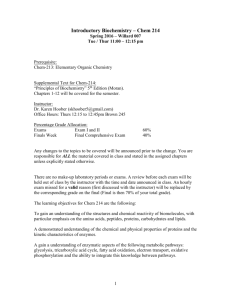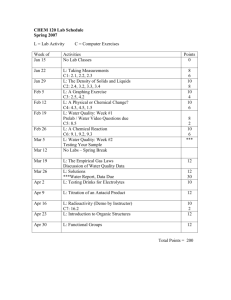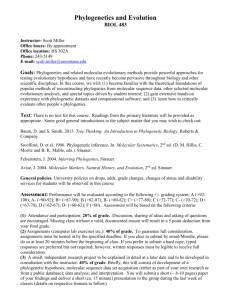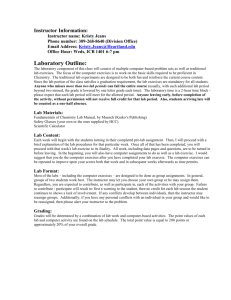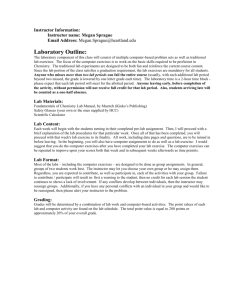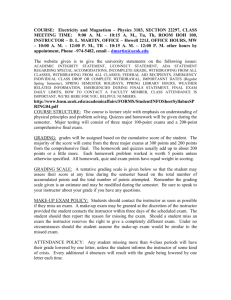Syllabus - Analytical Methods in Evolutionary Anthropology
advertisement
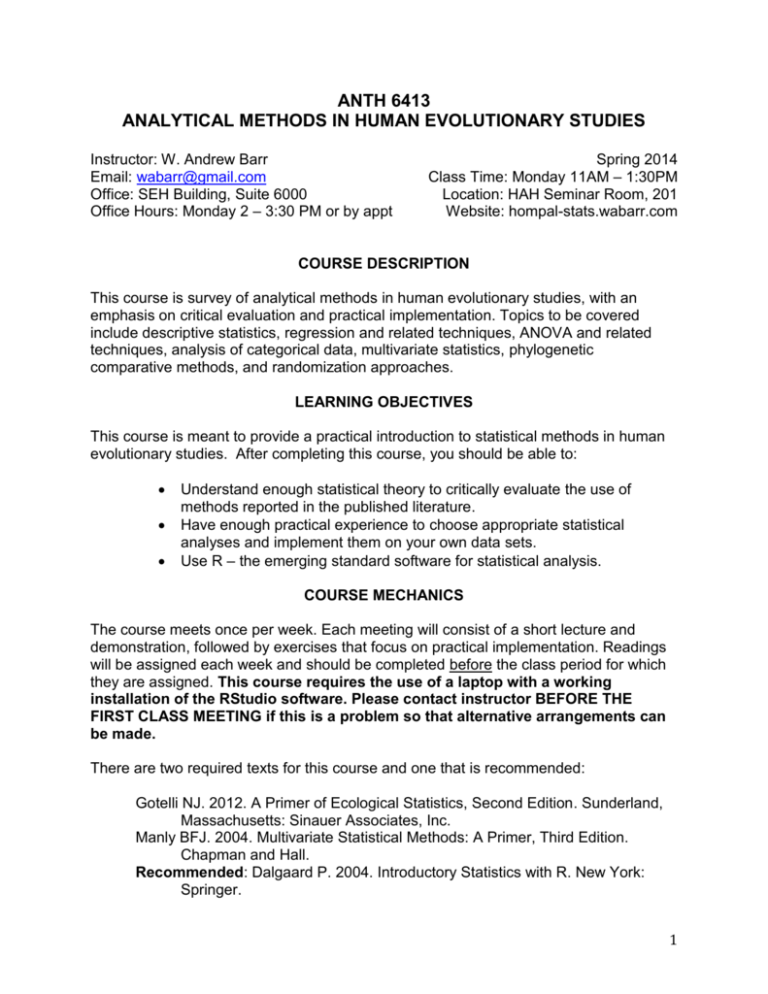
ANTH 6413 ANALYTICAL METHODS IN HUMAN EVOLUTIONARY STUDIES Instructor: W. Andrew Barr Email: wabarr@gmail.com Office: SEH Building, Suite 6000 Office Hours: Monday 2 – 3:30 PM or by appt Spring 2014 Class Time: Monday 11AM – 1:30PM Location: HAH Seminar Room, 201 Website: hompal-stats.wabarr.com COURSE DESCRIPTION This course is survey of analytical methods in human evolutionary studies, with an emphasis on critical evaluation and practical implementation. Topics to be covered include descriptive statistics, regression and related techniques, ANOVA and related techniques, analysis of categorical data, multivariate statistics, phylogenetic comparative methods, and randomization approaches. LEARNING OBJECTIVES This course is meant to provide a practical introduction to statistical methods in human evolutionary studies. After completing this course, you should be able to: Understand enough statistical theory to critically evaluate the use of methods reported in the published literature. Have enough practical experience to choose appropriate statistical analyses and implement them on your own data sets. Use R – the emerging standard software for statistical analysis. COURSE MECHANICS The course meets once per week. Each meeting will consist of a short lecture and demonstration, followed by exercises that focus on practical implementation. Readings will be assigned each week and should be completed before the class period for which they are assigned. This course requires the use of a laptop with a working installation of the RStudio software. Please contact instructor BEFORE THE FIRST CLASS MEETING if this is a problem so that alternative arrangements can be made. There are two required texts for this course and one that is recommended: Gotelli NJ. 2012. A Primer of Ecological Statistics, Second Edition. Sunderland, Massachusetts: Sinauer Associates, Inc. Manly BFJ. 2004. Multivariate Statistical Methods: A Primer, Third Edition. Chapman and Hall. Recommended: Dalgaard P. 2004. Introductory Statistics with R. New York: Springer. 1 EVALUATION Your grade will be calculated based on exams, homework assignments, and one class presentation of the week’s methods. For this presentation, you must find a real world dataset with an associated published dataset (that you can access). You will walk the class through a relevant question related to this dataset, including how to do this analysis using R. The demonstration should take approximately 45 minutes. Please consult with the instructor about this demonstration before the week it is due. If you have any concerns about your grade on a particular assignment, please contact the instructor as soon as possible, rather than waiting until the end of the semester. Exam I Exam II Combined Homework Class Presentation 25% 25% 40% 10% ACADEMIC INTEGRITY You are responsible for upholding the GW Code of Academic Integrity. Please review the code here http://studentconduct.gwu.edu/code-academic-integrity. You are expected to do your own work. Class presentations and exams must be the sole work of the student. Collaboration is allowed on homework assignments, but copying the answers or R code from another person constitutes cheating, and will be dealt with by reporting the violation to the Office of Academic Integrity. ATTENDANCE POLICIES You should attend every class session unless you have a legitimate excused absence. Late work will only be accepted, and make-up exams will only be offered, if there is a valid (e.g., medical, religious) justification. See below for a summary of the university policy on religious holidays: 1. Students should notify instructors during the first week of the semester of their intention to be absent from class on their day(s) of religious observance; 2. Instructors should extend to these students the courtesy of absence without penalty on such occasions, including permission to make up examinations 3. Instructors who intend to observe a religious holiday should arrange at the beginning of the semester to reschedule missed classes or to make other provisions for their course-related activities 2 COURSE SCHEDULE DATE TOPIC Homework & Readings Jan 12 Intro to the Course, Intro to R See http://hompal-stats.wabarr.com/homework Jan 19 MLK DAY NO CLASS Jan 26 Visualizing Data and Automation See http://hompal-stats.wabarr.com/homework Feb 2 Basic Stats: Probability and Distributions See http://hompal-stats.wabarr.com/homework Feb 9 Basic Stats: Hypothesis Testing See http://hompal-stats.wabarr.com/homework Feb 16 PRESIDENT’S DAY NO CLASS Feb 23 Correlation and Regression Mar 2 EXAM I Mar 9 SPRING BREAK NO CLASS Mar 16 ANOVA and ANCOVA See http://hompal-stats.wabarr.com/homework Mar 23 Categorical Data See http://hompal-stats.wabarr.com/homework Mar 30 Multivariate Stats: I See http://hompal-stats.wabarr.com/homework Apr 6 Multivariate Stats: II See http://hompal-stats.wabarr.com/homework Apr 13 Accounting for Phylogenetic Signal (PGLS) See http://hompal-stats.wabarr.com/homework Apr 20 Resampling Approaches See http://hompal-stats.wabarr.com/homework Apr 27 Mixed-Models See http://hompal-stats.wabarr.com/homework Apr 29** EXAM II See http://hompal-stats.wabarr.com/homework ** Designated Wednesday 3



